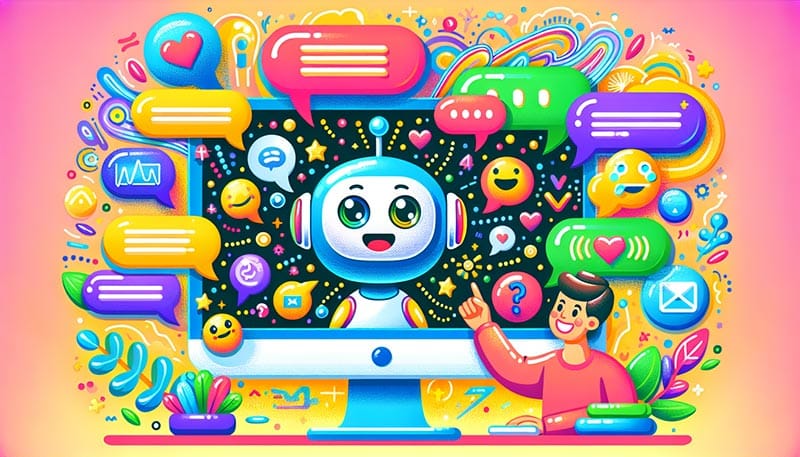
Top 7 AI Powered CX Strategies to Boost Customer Satisfaction
Improve Customer Satisfaction with AI
View Demo Request a Quote
- Key Takeaways
- Leveraging Predictive Analytics to Anticipate Customer Needs
- Enhancing Customer Interactions with AI-Powered Chatbots
- Virtual Assistants for Personalized Service
- Personalizing Customer Experiences with Machine Learning
- Automating Repetitive Tasks with Robotic Process Automation (RPA)
- Utilizing AI for Sentiment Analysis
- Real-Time Responsiveness for Improved Customer Satisfaction
- Optimizing Workforce Management with AI
- Implementing AI-Driven Quality Assurance
- Summary
- Call to Action
- Frequently Asked Questions
Looking to improve customer satisfaction with AI? In this article, we present the top 7 AI powered CX strategies that will transform your customer experience. You’ll learn how predictive analytics, AI chatbots, and more can help you boost customer engagement and satisfaction.
Key Takeaways
Harness predictive analytics to proactively understand and anticipate customer needs, enhancing satisfaction and engagement.
Utilize AI-powered chatbots for real-time, personalized interactions, ensuring 24/7 support and improving overall customer experiences.
Leverage machine learning and automation to personalize customer journeys, streamline operations, and maintain high service standards.
Leveraging Predictive Analytics to Anticipate Customer Needs

Predictive analytics has emerged as a game-changer in understanding and anticipating customer needs. Analyzing customer data such as order history, behaviors, and preferences allows AI to analyze customer data and offer valuable insights into customer behavior, facilitating targeted marketing and improved sales. AI’s transformative power shifts businesses from reactive to proactive strategies, helping them anticipate customer needs and boost satisfaction.The ability of AI to process large volumes of data quickly and turn it into actionable insights is unparalleled. Imagine analyzing customer data in real-time, gaining insights that allow adaptation to preferences and the delivery of personalized experiences. AI’s continuous learning capability ensures prediction accuracy improves over time, enhancing the robustness and effectiveness of your customer experience strategy.

Discover the full value of AI in customer service
Understand the benefits and cost savings you can achieve by embracing AI, from automation to augmentation.Calculate your savingsTracking and analyzing real-time customer behavior allows businesses to provide personalized experiences, boosting satisfaction and fostering loyalty by demonstrating a deep understanding of customer needs throughout the entire customer journey. AI customer experience technologies enhance customer experience and service operations, making interactions more personalized, efficient, and impactful.Predictive analytics plays a crucial role in customer experience by helping companies anticipate customer needs and deliver exceptional customer experiences. Leveraging AI transforms data into actionable insights, improving customer engagement and overall satisfaction. This proactive approach often exceeds customer expectations, ensuring a competitive edge in the market.
Enhancing Customer Interactions with AI-Powered Chatbots

AI-powered chatbots have revolutionized customer interactions by providing immediate responses to customer inquiries. In a world where 62% of consumers prefer using chatbots for customer service agents, the importance of these AI tools cannot be overstated. These chatbots operate continuously, ensuring that customer support is available at any time, even outside regular business hours, thus enhancing customer satisfaction.A key benefit of AI chatbots is their capacity to handle large volumes of queries without human intervention. This automated customer service saves costs by automating repetitive tasks and enables businesses to engage with a larger customer base by managing multiple conversations simultaneously. Freeing up human agents to focus on more complex issues allows for a more efficient allocation of resources.AI chatbots also enhance personalization by analyzing customer data and maintaining context across interactions. This leads to more tailored interactions that cater to individual customer needs, thereby boosting customer engagement and loyalty. Chatbots’ ability to collect valuable data on customer interactions aids in informed business decisions, further enhancing customer engagement.Conversational AI elevates a brand’s image by demonstrating a commitment to modern and innovative customer service solutions. Providing round-the-clock assistance and personalized interactions, AI chatbots play a crucial role in delivering exceptional customer experiences and increasing satisfaction.
Virtual Assistants for Personalized Service
Virtual assistants are revolutionizing the way businesses provide personalized service to their customers. By leveraging artificial intelligence (AI) and natural language processing (NLP), virtual assistants can analyze customer data and behavior to offer tailored recommendations and solutions. This not only enhances the customer experience but also helps businesses to better understand their customers’ needs and preferences.Imagine a virtual assistant that can remember your past purchases, understand your preferences, and suggest products or services that align with your tastes. By analyzing customer data, virtual assistants can provide a level of personalization that was previously unattainable. This deep understanding of customer behavior allows businesses to offer more relevant and timely recommendations, making customers feel valued and understood.Moreover, virtual assistants can engage with customers in a more human-like manner, providing a seamless and interactive experience. They can handle a wide range of tasks, from answering queries to processing orders, all while maintaining a personalized touch. This not only improves customer satisfaction but also frees up human agents to focus on more complex issues, enhancing overall operational efficiency.Incorporating virtual assistants into your customer experience strategy can significantly boost engagement and loyalty. By offering proactive support and personalized interactions, virtual assistants help businesses build stronger relationships with their customers, ultimately leading to increased satisfaction and retention.Personalizing Customer Experiences with Machine Learning

Personalizing customer experiences is at the heart of building strong customer relationships, and machine learning plays a pivotal role in this process. Analyzing data such as user behavior, purchase history, and interaction history enables AI to understand customer preferences and deliver tailored recommendations. Such personalization makes customers feel valued, significantly boosting loyalty and repeat business.Machine learning enables real-time personalization by adjusting site content based on customer actions. Imagine visiting a website that intuitively adapts to your preferences, offering personalized recommendations and products or content aligned with your interests. This enhances the shopping experience and drives engagement and satisfaction. Personalized experiences are no longer a luxury but a necessity in today’s competitive market.Tailored recommendations based on previous interactions enhance engagement by providing relevant and timely suggestions. Personalized emails, product recommendations, and targeted marketing campaigns enabled by machine learning help businesses connect with customers on a deeper level. This approach not only meets customer expectations but often exceeds them, creating exceptional customer experiences.
Automating Repetitive Tasks with Robotic Process Automation (RPA)
Robotic Process Automation (RPA) is a powerful tool for automating repetitive tasks, enhancing operational efficiency, and improving overall customer satisfaction. RPA technology mimics human interactions with applications to automate routine tasks like data entry and processing. This leads to quicker resolutions and reduces the risk of human errors commonly found in manual tasks.Integrating RPA with existing IT systems allows businesses to streamline data handling and reduce operational costs. Increased accuracy in data processing enables better decision-making and improved customer service. RPA significantly reduces the time and resources needed for mundane tasks, enabling employees to focus on higher-value work requiring critical thinking and creativity.Automating customer service functions with RPA provides quicker resolutions, enhancing satisfaction. This technology allows organizations to better allocate their human resources towards strategic tasks that directly impact business outcomes. The efficiency and accuracy brought by RPA not only improve the customer experience but also contribute to overall business success.Utilizing AI for Sentiment Analysis
Understanding customer emotions is crucial for delivering exceptional customer experiences, and AI-powered sentiment analysis makes this possible. Sentiment analysis tools use machine learning and natural language processing to interpret the emotions behind customer feedback. These tools can categorize emotions into specific feelings like joy, sadness, and anger, offering deeper insights into customer sentiments.Some sentiment analysis platforms can automatically group customer feedback into common themes and trends, simplifying analysis and action for businesses. Real-time monitoring of brand mentions across online platforms helps businesses promptly understand public sentiment and respond to potential reputation issues.AI sentiment analysis assists businesses in detecting shifts in customer emotions, enabling rapid response to potential reputation issues. Gathering data from various touchpoints throughout the customer journey, tools like Medallia provide valuable insights into ai customer sentiments. This proactive approach helps businesses maintain a positive brand image and enhance customer satisfaction.Real-Time Responsiveness for Improved Customer Satisfaction
In today’s fast-paced digital landscape, real-time responsiveness is critical for improving customer satisfaction. By leveraging AI-powered CX strategies, businesses can respond to customer inquiries and concerns in real-time, reducing response times and enhancing overall customer satisfaction.Imagine a customer reaching out with a query and receiving an immediate response, regardless of the time of day. AI-powered systems can handle a high volume of interactions simultaneously, ensuring that no customer is left waiting. This level of responsiveness not only meets but often exceeds customer expectations, fostering a sense of reliability and trust.Real-time responsiveness also enables businesses to engage with customers in a more timely and personalized manner. By analyzing customer data and anticipating needs, AI can provide proactive support, addressing potential issues before they escalate. This proactive approach not only improves the customer experience but also reduces the burden on customer service agents, allowing them to focus on more strategic tasks.Furthermore, real-time responsiveness enhances the overall customer journey by providing seamless and efficient interactions. Whether it’s resolving an issue, answering a question, or offering a recommendation, timely responses contribute to a positive customer experience, ultimately boosting satisfaction and loyalty.Optimizing Workforce Management with AI

AI-driven workforce management tools provide data-driven predictions on staffing needs and resource allocation, enhancing operational efficiency. These tools enable proactive planning and real-time adjustments, resulting in time savings and cost reductions. Automating mundane tasks with AI optimizes workforce management, allowing employees to focus on strategic initiatives.Advanced artificial intelligence solutions facilitate strategic workforce planning by enhancing the roles of planners, forecasters, and schedulers. AI-driven systems enable employees to bid on work plans, increasing job satisfaction by aligning schedules with personal preferences. The flexibility and efficiency brought by AI in workforce management contribute to a more engaged and productive workforce.Leveraging AI in workforce management not only enhances customer engagement but also delivers efficient business operations. By integrating AI-driven insights, businesses can make data-driven decisions that improve overall service quality and customer satisfaction. Ethical considerations and data privacy are critical in the implementation of AI-driven predictive analytics, ensuring responsible use of technology.